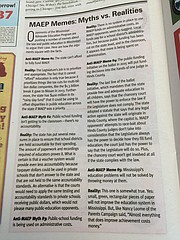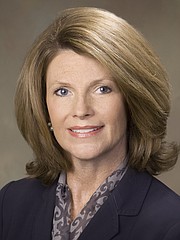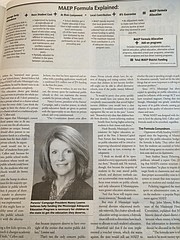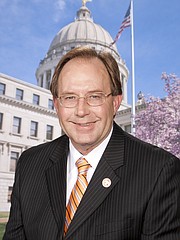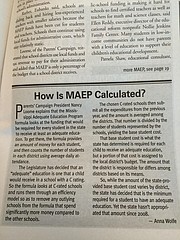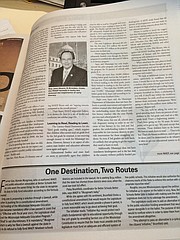Wednesday, November 19, 2014
Grant Callen, the fiscally conservative president of Empower Mississippi, says putting more money into public education is not the solution to the problems of academic achievement in the state. He prefers “school choice” and “economic freedom.” Photo by Trip Burns.
The method by which Mississippi delivers education to its students is like a vehicle. Some say it's a car with a broken battery—no matter how much gas the state puts into it, it's not getting anywhere.
But others look at the goal of education as a benchmark hundreds of miles away. It doesn't matter how nice the vehicle is, if the state doesn't provide enough gas to get the car to its destination, it fails.
Either way, the quality of education in Mississippi is falling behind the rest of the nation with only 61 percent of students graduating from high school on time and two-thirds of kindergarteners not ready to learn how to read. State legislators have failed to provide resources to public schools in the amount they previously agreed was necessary for students to receive an adequate education.
The Legislature established this agreement, called the Mississippi Adequate Education Program, in 1997 to provide a formula for the state to determine how much money to appropriate to public education to give all students to at least an "adequate" level of education. But the Legislature has only appropriated the amount MAEP mandates two out of the last 17 years.
Many Republican state leaders point to problems with the formula—from the way it counts students to the lack of structure to the spending capabilities of the schools.
But, others charge, these complaints are only a curtain for leaders who don't believe in public education—who would rather see education privatized—to hide behind.
Under Legal Threat
Before MAEP, Mississippi operated on a system for public-school funding established in response to Brown v. Board of Education in 1955, when the state adopted a minimum education-funding act that only provided a 6th-grade level of education for many of Mississippi's school children.
When the Legislature adopted MAEP in 1997, other states were facing lawsuits over the underfunding of public schools, particularly schools in low-income areas. MAEP was designed to provide resources to school districts in struggling communities that couldn't make up the school-funding locally in order for its students to receive an adequate education.
The MAEP formula addressed this disparity by providing an extra 5 percent of the base student cost for students who qualify for free or reduced lunch, even though studies suggest children living in poverty need significantly more resources to have the same outcomes as those in higher income families.
The formula finds the average spending of C-rated schools and divides that amount by the average daily attendance of its students to determine the amount needed for each student to have an adequate education.
Better Schools Better Jobs organizer Patsy Brumfield said this is a way the state ensures that the money follows the student. Schools with a greater population of students get more funding.
MAEP was, in reality, Mississippi's way to avoid being sued by creating the illusion of equity in public education, funding advocates say. But the state Legislature has not funded schools according to its own formula since 2008.
"They weren't fully funding it in violation of the law," said Mike Sayer, senior organizer and training coordinator and co-founder of Southern Echo, an organization focused on developing leadership in the African American community.
Groups like Southern Echo compare the state's disregard of the low-income community's education needs to education systems that developed after the abolition of slavery. During slavery, it was illegal to teach African Americans to read or write in the South. Afterward, education delivery for blacks was limited. The Hampton-Tuskegee model that spread throughout the South prohibited schools that taught African Americans to teach any critical-thinking-focused subjects like philosophy, prohibited the teaching of specific trades and forced the idea that only white people belong in politics.
Today, affected students who are not receiving adequate education are those who are economically disadvantaged—a group that makes up 71 percent of Mississippi's students.
While the Legislature passed MAEP in 1997, the first year it was fully funded was in 2007 after three years of intense campaigning. In 2006, then-Gov. Haley Barbour attacked public education and called the MAEP formula "artificial." Then, after pressure from education advocates and the Parents' Campaign, made up partly of Barbour constituents, he changed his tune.
In 2007, an election year, Barbour committed to fully funding MAEP. "This is politics, right? Get out from in front of that train that's about to run you over," Sayer said.
Federal Katrina recovery funding made full funding easier because the state was able to divert those funds to other departments, leaving funds free for education. MAEP was again fully funded in 2008, a federal election year. The Legislature actually approved full funding of the program in 2009, but the recession hit the state hard, making the actual revenues dip below the projected revenues, and the governor was afforded the power to cut the budget down.
MAEP was no longer fully funded, and so began the fight among state leaders to increase public education funding to an adequate amount, or at least protect it from being hacked away.
"Every year with Barbour after that, it was a matter of how many hundreds of millions we could save from the draconian cuts he was seeking to achieve," Sayer said.
Parental Choice or Privatization?
"So what's the fight about?" Sayer prompted.
Southern Echo and other educational organizations argue that those who oppose MAEP likely have a straightforward, anti-government agenda. "There are people who really don't believe in traditional public education. They want to privatize it," Sayer said.
Some alternative educational methods to public school include charter schools, which allow public funding to follow the student to a charter school they choose (and that admits them), and educational savings accounts, which give public funds to parents to allow them to use on private-school tuition or other educational programs for their children.
While Grant Callen, president and founder of Empower Mississippi, which lobbies for "restrained state government" and "school choice," doesn't believe full funding of MAEP will solve Mississippi's education problems, he said he doesn't want to do away with public education completely.
"This education choice gets labeled: 'Well, you just want to privatize the whole system.' That's not true at all. I don't pretend to think that a private school or a charter school is what's best for every child. I just think the parent ought to have the choice of a private school or a charter school or a traditional public school," Callen said.
Callen argues that Mississippi's current public-school system tries to fit students into a one-size-fits-all education, but said children are unique. Instead, the state should allow parents to use public-education funds in a schooling program works best for their child—including private schools, he argues.
The result would not be a "mass exodus" of students from public schools, Callen said, because for most students, public school works. But if the students whose needs are not met in public schools could leave for a better fit, the students who stay in public schools would do better, too, Callen said.
Callen cites the bump in education achievement for the majority special-needs students in public schools in Florida when 6 percent of them were able to transfer to alternative schools after the state's special-needs voucher system was implemented.
Callen said this might have to do with a "healthy sense of competition" that the public schools would then have with the alternative schools.
"Just by giving a few kids options, it's remarkable how much it changes academic achievement for all kids," Callen said.
On the other side of the fence, Sayer warned that charter schools divert funds from public schools, where most children receive their education. Two new charter schools in Jackson, one that has been approved and another with a pending application, would pull a combined $24 million out of JPS funding in the first five years.
"They want to reduce, in any way they can, the money spent for traditional public schools so they can maximize the money available for private schools," Sayer said.
Nancy Loome, president of the Parents' Campaign, said a voucher system, in which public-education funds are given to parents with the opportunity to use them on private school, isn't even constitutional.
"Our Constitution doesn't even allow that because taxpayers deserve to have oversight of the entities that receive public dollars," Loome said.
That's not the only concern public-education advocates have with the voucher system. Allowing parents to use public funds for education wherever they wish, Loome cautions, would create a divide between classes. Private schools always have the option of charging and raising tuition, which means that children in low-income families still might not be able to afford alternative schools, even if the public money followed them there.
"It would be pretty clear pretty quickly that you would have one system that was completely unaccountable that served higher income children—you would have a class segregation. It wouldn't necessarily be a racial segregation like we saw in the past," Loome said. "Research is very clear that children benefit from diversity. Lower-achieving students benefit from having higher-achieving students in their classes with them."
Hank Bounds, Mississippi's commissioner for higher education, argued at the Nov. 3 Stennis-Capitol Press Forum that focusing resources on public education will be critical to improving educational attainment in the state and, in turn, economic development.
"I think we should all be open-minded to every opportunity available out there," Bounds said. He warned, though, that because the majority of students in the state attend public schools, and alternate methods cannot accommodate most students, the focus must remain on public schools and early education if Mississippians want greater education attainment.
"And that focus will require enormous resources," Bounds said.
But even if Mississippi implemented alternate educational methods statewide, like charter schools and education savings accounts, a formula must still exist to determine how much money to allocate to each student's education. Brumfield said that if the state implemented a voucher system, which she warns against, the state would still use MAEP to determine how much money to grant each child, meaning that "educational choice" would not do away with MAEP.
Callen said that he can't determine whether the state is spending enough on public education currently "until we fix the other things that are more important to solving our education problem."
Since 1972, Mississippi has almost tripled its spending on public education, adjusted for inflation, while average ACT scores have remained stagnant. During that time, though, Mississippi was greatly underfunding many of its public schools, causing great disparity in the quality of education between classes and races.
While MAEP was designed with the intent to level the playing field, Callen said the formula needs to be reworked, regardless.
The Formula Conundrum
Opponents of fully funding MAEP have argued since the beginning of Mississippi's fight over the public-education budget that the formula is faulty. They either don't like how the students are counted or believe the funds are being spent on excessive administration costs and not in classrooms.
State Auditor Stacey Pickering, a Republican, released a report Oct. 20 claiming that MAEP's current structure does not have mandates "in place to require districts to target funds to classrooms and students, nor does proper accountability exist in the current system to ensure that state taxpayer funds are spent on students and needed resources."
Pickering suggested the money is being spent on administrative costs, as opposed to on the students—a popular Republican argument against MAEP.
Rep. John Moore, R-Brandon, chairman of the Mississippi House Education Committee, explained that MAEP looks at historic data of school-district spending to determine where money is being spent and uses that information to determine where money should be allocated in the future.
"The formula now is telling us that there needs to be more money spent on administration and less money spent in the classroom, which tells us that over the last few years that's what the school districts have been doing," Moore said.
Echoing Pickering's findings, Moore maintains that schools have cut money spent in the classroom and used the savings to increase salaries for administration.
But educators, including Shannon Eubanks, principal of Enterprise Attendance Center in Lincoln County, say that is impossible because there is not a system in place to use MAEP funding on a school's administration.
Rather, Eubanks said, schools are dialing back and hiring less-experienced teachers with smaller salaries because the MAEP funds have been cut for students and teachers. Schools then continue using local funds for administrative costs, which stay relatively static.
Loome, of the Parents' Campaign, reiterated that school districts use local funds and tax revenue to pay for their administration and added that MAEP is only a percentage of the budget that a school district receives.
"We're taking a look right now ... at what it costs per district just to pay their teachers. We have some districts ... that the MAEP funding ... does not even cover the cost of all their teachers. So how can we say that we are spending more money on administration with MAEP funds?" Loome said.
In higher-income communities, local funds are available to pick up the slack left by MAEP cuts, while lower-income communities rely on federal funds to make up the difference.
In Holmes County, a lack of public-school funding is making it hard for schools to find certified teachers as well as teachers for math and science classes, said Ellen Reddy, executive director of the educational reform nonprofit Nollie Jenkins Family Center. Many students in low-income communities do not have parents with a level of education to support their children's educational development.
Pamela Shaw, educational consultant, president and founder of P3 Strategies who recently spoke on the need for strong public education at TEDxJackson, said the lack of funding contributes to fewer teachers in struggling school districts, thus bigger class sizes. Those teachers are typically more inexperienced. Schools in low-income communities are not able to provide technology education to students, causing concern considering that Common Core tests are computerized.
On a rainy day at a school in the Delta, one of Shaw's colleagues noticed that the faculty had to place buckets around the classroom to catch the water dripping from above. This is a stark example of the conditions of struggling schools in the state.
"It's like, 'Ooh, kids have to learn in this every day?'" Shaw said. "It's a very vicious cycle that's compounded by our unwillingness to invest in our children."
Ultimately, the state is not providing resources in order to help children fill the gap in funding not compensated on the local level. MAEP was, after all, designed to give low-income students an equal opportunity.
"I've seen research that says you need an additional 30 percent per child in poverty to level the playing field, and I've seen research that says you need an additional 245 percent to level the playing field, so it is really all over the map," Loome said.
But because MAEP only offers a 5 percent increase for students in high-poverty areas, and MAEP isn't being fully funded, those students are afforded virtually no additional funding.
Reddy works with families in Holmes County and acknowledges that inadequate funding of public education keeps academic achievement and overall social mobility stagnant. In 2015, the state will spend less money on public education than in 2008, the last year MAEP was fully funded.
"If we're spending less now than we did, what, seven years ago, how do we expect our children to receive a quality public education? We can't," Reddy said.
State Sen. Hob Bryan, D-Amory, one of MAEP's authors, said nothing is wrong with the formula and that the only way for the state to fund public education adequately is for its citizens to elect leaders who will prioritize education.
Republicans who oppose fully funding MAEP, Bryan said, are "arguing minutia compared to the overall picture."
Their hope, MAEP supporters believe, is to drown the facts in a sea of myths and confusion (see sidebar, page 24).
Learning to Read, Reading to Learn
The Literacy-Based Promotion Act aka "third grade reading gate," which requires that children who cannot read on grade level by the 3rd grade be retained, is not receiving enough money to work for Mississippi students. However, literacy is an aspect of education state leaders and education advocates stress again and again.
Educational bodies and state leaders seem to universally agree that children must be able to read by 3rd grade and must be prepared to start reading to learn in 4th grade. But Reddy said the state has "not at all" adequately funded the act, which was passed in 2013 and based on a program in Florida, which puts a literacy coach into every school with the grades K-3 and has seen great success.
The state Legislature allocated $8 million the first year, $15 million the second year and another $15 million as the program moves into its third year.
Moore argues that the program has been adequately funded, even though the Florida program it's modeled after allocated $1 billion to its literacy program.
Sayer said Mississippi has only implemented the pilot program and only funded the program for 16 percent of schools with grades K-3.
"There are more than 18,000 children reading below grade level in the 3rd grade in this past year. If you calculate that in order to be behind reading in the third grade, you're likely behind in reading in the first and second grade. ... You triple that 18,000, and it's over 55,000," Mississippi children reading below grade level, Sayer said according to information from Southern Echo.
Right now, Sayer said, the Mississippi Department of Education does not have the funds to provide intervention and support for children retained after third grade. Shaw said the underfunding means that schools can't hire literacy coaches—like the ones Florida put into each school grades K-3.
While some, but not all, schools provide diagnostic testing in order to see the cause of low literacy in 1st, 2nd and 3rd graders, the underfunding makes it almost impossible for low-income districts to provide intervention for those struggling students. So even if 3rd graders are held back, it's unlikely they are going to get the support they need to learn to read.
Additionally, Mississippi does not have mandatory kindergarten and is the last state in the country without publicly funded pre-kindergarten. A MDE study found that 66 percent of kindergarteners were not ready to learn to read, raising concerns about their future educational success.
Moore is careful to avoid the suggestion that Mississippi needs to focus on early education, which would cost the state more money. "We need to be emphasizing not early education but, like, early detection," Moore said, referencing dyslexia and other special-education needs.
On Oct. 14, Gov. Phil Bryant, who is against full MAEP funding, spoke about the importance of literacy and his experience growing up with dyslexia in an interview with Mississippi Public Broadcasting.
When asked how the state plans to fund literacy promotion, Bryant brought up unrelated undertakings and said he would ask for additional funds for high-school vocational programs and tourism.
"We look at additional money in education, particularly in workforce development. I would like to see the opportunity for a student who comes through our tech-prep program in high school to get a college degree at a community-college workforce-training program furnished to them, a scholarship if you will, if they'll stay within the workforce in Mississippi. So, yeah, you'll see recommendations from economic development. We're going to ask for five million more dollars for tourism," Bryant said.
"So, yes, we'll be asking for some targeted spending there. Forty-six percent of our children in the 3rd grade can't read on a 4th grade level. That's a frightening statistic ... That's been going on for 50 years. At some point, we've got to say: 'We won't accept that anymore. These children have to do better. We have to teach them to read.' ... That is the key. That's the future workforce, and it's got to be done, and I'm determined to do whatever it takes to get our educational system to that next level."
Misplacing the Moral Center
Sayer said it's clear that the majority of state leaders are unwilling to prioritize public education, which he calls an indicator of where their moral center lies.
Every politician, including Gov. Bryant, stresses the importance of early education and literacy on academic achievement. Every politician acknowledges the importance of improving education for advancing virtually every other aspect of the state. But they refuse to spend the money to change it.
"If you know that's the case, and you are unwilling to put money into it as a priority because it's more important to you to reduce taxes on businesses, that's your priority. But let's face what that moral center means," Sayer said.
Some simply say Mississippi can't afford to fully fund MAEP. Yet, the state has provided large tax breaks to businesses in recent years, including $1.33 billion to Nissan. The state traded the cuts for a promise for good-paying jobs from the manufacturer. Mississippi also loaned $75 million to a KiOR biofuel plant in 2010 and $35 million to a beef-processing plant in Yalobusha County in 2004—very little of which was ever paid back. But that doesn't seem to matter.
One Destination, Two Routes
How can we fix the problem? Former Gov. Ronnie Musgrove is using a lawsuit to try to recover funds owed by the state while Better Schools Better Jobs is attempting to amend the constitution through a ballot initiative.
"Education is not the number-one issue. The real number-one issue is the economy," Moore said.
Moore then said, though, that until the state improves its education system, its economy will remain virtually stagnant. When pressed on tax cuts, Moore said he's in favor of "letting the taxpayer keep their money."
"They're the ones that make it. They do better with it than I do," Moore said.
But Mississippi's struggle in locating a moral center is more than a finance issue. "Treating it as a mechanical budget issue, an accounting issue, misses the entire point of what the struggle's about," Sayer said.
State Sen. Bryan said the people who claim that the state doesn't have enough money to fully fund MAEP are the same ones who support tax cuts to companies. These opponents to MAEP are better organized than they were in the early 2000s—they're "no longer being bashful about it," Bryan said.
Callen argues that Mississippi's educational system can't be solved by the proverbial throwing money at it, to which Loome counters, "Money, in and of itself, obviously does not improve achievement, but almost everything that does improve achievement costs money."
Despite the rhetoric, Republicans continue to look at education in Mississippi like a car with a dead battery.
"A lot of people in our state simply think if we just keep pouring gas in a car with a dead battery, that's going to solve our problems. And the truth is, we need some fundamental reforms that will jump start our car," Callen said.
But Sayer argues that the destination is unachievable without the necessary resources. "I only give you enough gas to get you to St. Louis. Can your great new, brand new Cadillac get all the way to Chicago? No. If that's the benchmark—getting to Chicago—you fail, even with the best tools," he said.
Bounds said simply that "Mississippi can do better" if state leaders will recognize the importance of improving education, and the necessity of funding to accomplish it.
"It will require significant focus early, which will require significant resources," Bounds said. "And I understand all the arguments. I recognize we are not a resource-rich state. I recognize that there are limited dollars available."
"The problem is, if we don't get really focused on dealing with the education issue, K through universities, then someone else will be standing here in front of a group just like this 10 years from now, with the types of questions being asked, and folks asking 'Why aren't we making more headway in education?'"
Read more about public-education funding at jfp.ms/maep.

